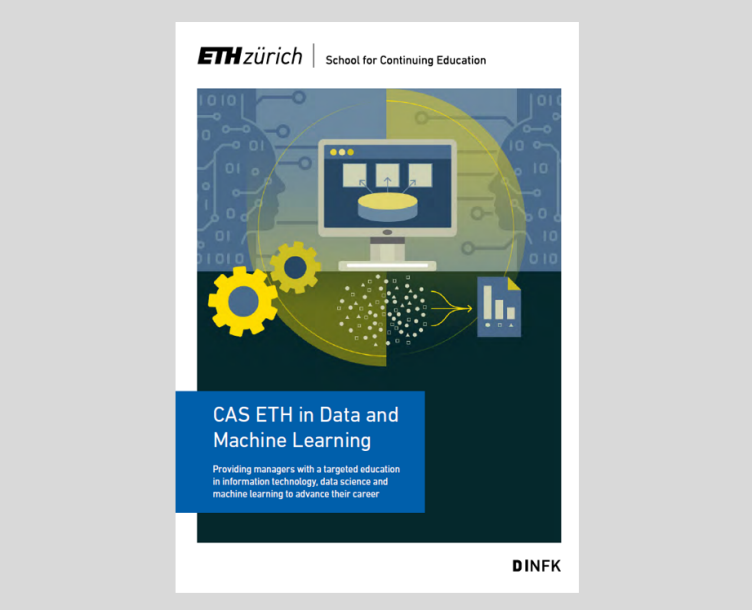CAS AI, Data & Machine Learning
Providing a targeted technical education in AI, data science and machine learning (ML) to advance the careers of industry managers and leaders
Decision-making in organizations is increasingly data driven and yet often has high degrees of uncertainty and variability. Getting those management decisions right demands that decision-makers understand both the potential and the limits of the data, the data analysis, and the software-based AI models making predictions using the data. Deciding how much trust to place in the recommendations of a machine learning model is not a simple exercise and has the potential to generate significant impacts on operations, customers, suppliers and stakeholders. This is where the CAS in AI, Data and Machine Learning (CAS DML) comes in.
The CAS DML provides a targeted education in AI, data science and machine learning to business managers to advance their careers. The aim of the programme is to improve the decision-making and collaboration skills of managers by providing them with fundamental data science and ML/AI training that is applicable across multiple industries and areas of the organization. Courses include hands on projects and exercises that give a practicial understanding of the strengths and limitations of AI technologies. Ethical considerations are also explored.
The target audience for this program is managers with any educational background and a minimum of five years of professional experience who need to make technology-related decisions in their companies. It is appropriate both for people with non-technical backgrounds (business, economics, law, social sciences, etc.) and for people with technical backgrounds who have gaps or want to refresh their knowledge with fundamental technical training in these areas.
Graduates will be able to communicate better and develop stronger relationships with IT, data science and ML/AI staff. In turn, this will enable them to extend their existing management skills to take on more challenging leadership roles in interdisciplinary projects with significant IT, data science and ML/AI components.
If you are also looking at our other CAS and trying to decide which one to follow first, please read our guidance on the CAS Programmes overview page.
Course descriptions
Lecturers: Dr. Lukas Fässler & Dr. Markus Dahinden
Introduction to Programming provides a practical introduction to some basic concepts and techniques for information processing and their practical applications. The programming languages used are Python and SQL. Participants learn to develop mathematical models for real-world problems and solve them as small projects. The following programming concepts are covered: variables, data types, control structures, sequential data types, functions, and managing data with relational databases.
Participants develop their programming skills through project-based work, online tutorials and individual support.
Lecturer: Prof. Bernd Gärtner
This course provides an introduction to computer science concepts that are foundational for later work in the CAS and MAS program.
We will cover how information is managed as data, and how we use computers to process data and generate new insights. Concrete questions we will address include: what is data, and how does it represent information? What is a computer, and how does it work? What is a computer program? What is a programming language? What is an algorithm? How can we measure the efficiency of algorithms? What kind of computers do we have today, and why? Through this, we will build a fundamental understanding of how computers and data science enable today's information society.
Lecturers: Dr. Andreas Streich & Dr. Marcel Lüthi
This course provides training in the areas of data science and machine learning. The course is intended for managers and leaders who want to understand the typical workflow, fundamental techniques and key challenges of data science and machine learning to drive successful implementation.
We will cover the following topics:
- The complete data processing pipeline from initial data understanding and cleaning through visualization to deriving reliable, action-oriented insights.
- Using exploratory data analysis to develop hypotheses.
- Statistical measures and evaluation of hypotheses.
- Essentials of machine learning: The classic tasks needed for automated learning from data, and common approaches to achieve them such as decision trees and neural networks.
- Model evaluation and selection e.g. using cross-validation.
- Foundations of Deep Learning as drivers to understand the transformative nature of neural networks.
- Challenges & Considerations: Potential pitfalls, threats, and ethical considerations.
Lecturer: Dr. Carlos Cotrini
This module discusses latest trends in AI and how to integrate them in the process of designing, implementing, and maintaining IT technologies. We study large language models, prompt engineering, recommendation systems, MLOps, and reinforcement learning. Participants apply this knowledge in a project where they assist a small retailer store to integrate AI in their business in three stages. First, they create an LLM-based marketing agent. Second, they build a recommendation system that analyzes customer behavior and recommends new items in their website. Finally, they apply reinforcement learning to optimize delivery of customer orders.
Additional information
Participants complete 4 modules over 4 months. Courses are generally conducted in either a block format or blended learning format to minimize time away from work. Classes are held at ETH Zentrum campus on seven weekends, each consisting of one full day (Friday) and one half-day (Saturday morning). Thus, this CAS is well suited as a part-time study programme.
Workload is approximately 300 hours.
Study language is 100% English.
CAS DML applicants must satisfy the following requirements:
- ETH recognised university degree at Master level or equivalent educational background
A bachelor degree can be exceptionally considered sur dossier.
- Demonstrated managerial experience
At least 5 years of professional work experience that includes some experience with allocation of corporate resources, e.g. line management, project management, etc.
- Good knowledge of English
At least B2 level is recommended.
MAS AID participants and applicants have priority over CAS only applicants. Applications will be reviewed by the Admission Committee. The final decision is communicated by the School for Continuing Education.
Please apply online through the School for Continuing Education website. After submitting the application and uploading supporting documentation, you will be asked to pay the non-refundable application fee of CHF 50 or CHF 150 depending on where you obtained your degree.
Application period: 1 - 31 May (Autumn start), 1 - 30 November (Spring start)
The tuition fee is 8,500 CHF and includes costs for software licenses, materials, etc. There are no other fees.
Applicants will receive an email notifying them when the admission decision letter is available for download in their eApply account. Admitted applicants do not need to confirm their intention to participate in the programme. A separate email will be sent with instructions on how to set up their ETH email and access their ETH student account (myStudies). All subsequent communication will be via the ETH email account.
To withdraw, the admitted participant must notify the School for Continuing Education by email (). Withdrawal is subject to the following fees.
- Free of charge: within 30 days from the date of the admission decision letter and before the beginning of the programme.
- CHF 3,500: more than 30 days after the admission date and before the beginning of the programme.
- CHF 8,500: after the start of the programme.
The CAS DML tuition fees and ECTS can be fully credited towards the MAS in AI and Digital Technology. Successful graduates of the CAS DML who wish to continue can apply to the MAS in the same manner as any other applicant. Prior completion of CAS will be considered during the application review, but there is no automatic right of admission to the MAS after completing individual CAS programmes.
The ETH programme regulations governing the CAS in AI, Data & Machine Learning can be downloaded using this link.
Interested in applying?
The next application period for the CAS in AI, Data & Machine Learning (CAS DML) is November 1 - 30 with classes starting in February.
Questions
If you need more information, please contact us:

